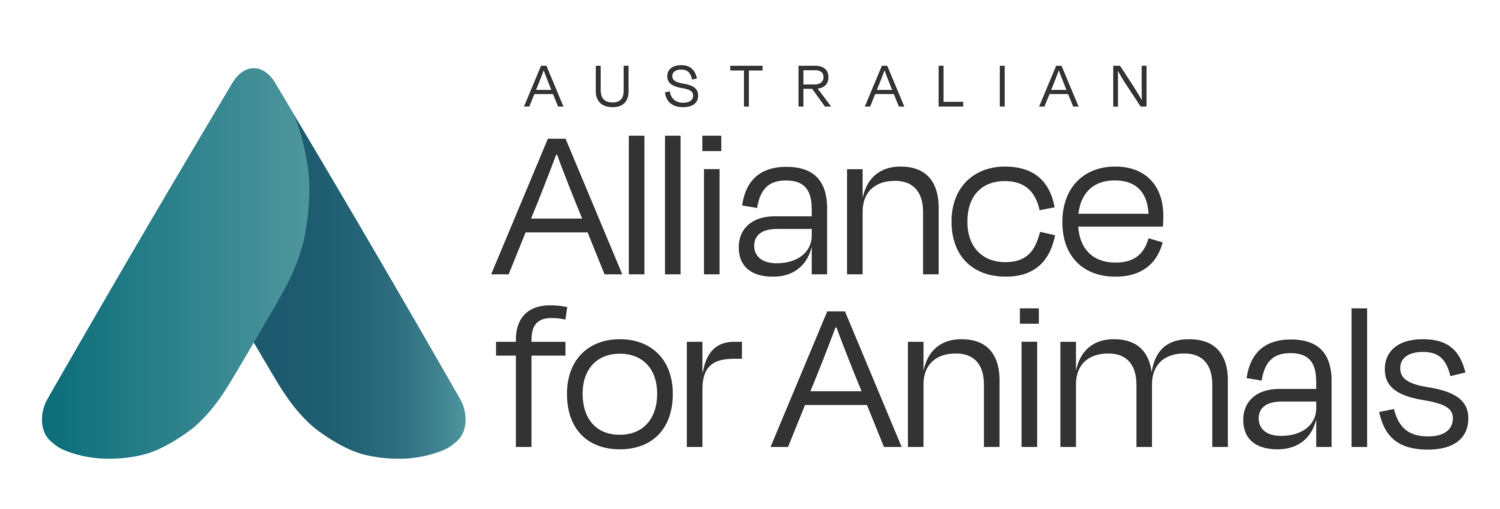
Our work
Read our latest news, blogs, submissions and media releases.
Building on momentum for animal welfare: The Alliance for Animals welcomes returning Government and new Parliament
The Australian Alliance for Animals congratulates the returning Albanese Labor Government and all elected members of the 2025 Federal Parliament.
Trophy hunting import ban and live sheep exports on Election agenda as parties lock in animal welfare commitments
The Australian Alliance for Animals has today revealed the positions of parties and independents on several key animal welfare issues ahead of the federal election.
Raising the profile of animal welfare this Federal Election
As the federal election approaches, it’s time to make animal welfare a priority. Learn about the six key animal welfare policy reforms we're urging political parties to support — from ending live sheep export to national standards — and find out how you can help influence change this election.
Progress toward a fairer Australia for Animals
After two full years of campaigning, it's time to reflect on the progress that has been made toward the Fair Go for Animals reforms.
Time is running out to secure an Independent Office of Animal Welfare
The NSW Labor Party made a commitment to improve animal welfare. Now, almost 2 years into their term, they have made little progress. Write to NSW Premier and the NSW Minister for Agriculture today.
It’s time to give animals a fair go
Australia’s animal welfare system is broken and animals across the country are suffering as a result. But together, we have the power to fix it. The 10th March is Fair Go for Animals Day, a national call to action, urging Australians to stand up for animals by demanding a fairer and more independent animal welfare system.
The power of political advocacy: A path to a fairer Australia for animals
In Australia, the animal welfare system is falling short, leaving millions of animals vulnerable to suffering. Political advocacy provides a critical pathway to addressing the systemic shortcomings, enabling us to create meaningful and lasting change for animals.
Live lamb cutting and the need for legislative reform
Live lamb cutting highlights the flaws in Australia’s animal welfare system. Explore how systemic failures enable cruelty and how we can reforms the system.
Fearmongering laid bare during NSW Inquiry into live sheep export phase out
NSW Department of Primary Industries and Regional Development (DPIRD) has debunked industry claims of major impacts on the NSW industry due to the phase out of live sheep exports.
Ensure battery cages are phased out in NSW
The NSW Government is seeking feedback on the draft Prevention of Cruelty to Animals Regulation 2025—this review is a critical opportunity to advocate for stronger protections—starting with a phase-out of battery cages.
Urge food businesses to do better for chickens
Australian chickens deserve better. Write a letter to food businesses, calling on them to adopt the Better Chicken Commitment standards into their supply chains and improve the lives of millions of chickens bred for meat.
Open letter to the Prime Minister of New Zealand
The Alliance for Animals, together with 19 leading animal protection organisations across Europe, Australia and New Zealand, have sent a joint open letter to the New Zealand Prime Minister, Christopher Luxon. In this letter, we urge his Government to maintain the ban on exports of farmed animals by sea.
Why does the standards development process matter for animal welfare?
The current process for reviewing and developing national standards for animal welfare in Australia is heavily dominated by industry interests, fails to consider contemporary science and community expectations, and lacks legislative accountability. Reforming this process would make the standards development process more inclusive, science-based, and accountable.
Racehorses deserve a fair go
Australia’s horse racing industry is riddled with systemic animal welfare issues. By reforming the system, we can better protect horses and provide them with the life-long care they deserve.
How will guiding legislative principles and sentience recognition improve animal welfare?
Australia’s Animal Welfare Acts need guiding principles to inform the application of the legislation, improve decision making, and ensure animals are protected, respected, and given the care they deserve.
Influence change: Your guide to engaging with decision-makers
Engaging with political decision-makers is a powerful way to drive real change in your community. The following toolkit aims to empower individuals like you to feel confident when engaging with MPs.
What does adequate funding for animal welfare services mean?
Within the current system, multiple agencies are responsible for different aspects of animal welfare enforcement, leading to inconsistent outcomes and protections for animals. The establishment of independent state Animal Welfare Authorities can change this.
Putting animals on the political map this Queensland election
The Alliance for Animals has partnered with RSPCA Queensland to raise the political profile of animal welfare during the Queensland election. We've contacted all registered parties to find out where they stand on the following six key reform issues for animals.
Inquiry into the impacts of the phase out of live sheep exports on NSW
The Alliance for Animals provided evidence to the Inquiry into the impacts of the phase out of live sheep exports on NSW. Our submission focuses on the extensive animal welfare concerns, the overwhelming community opposition to the trade, and the negligible impacts the phase out will have on the NSW sheep industry.




















